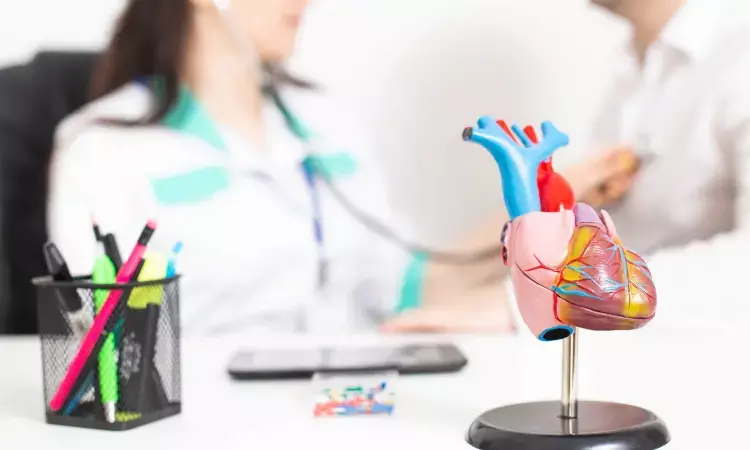- Home
- Medical news & Guidelines
- Anesthesiology
- Cardiology and CTVS
- Critical Care
- Dentistry
- Dermatology
- Diabetes and Endocrinology
- ENT
- Gastroenterology
- Medicine
- Nephrology
- Neurology
- Obstretics-Gynaecology
- Oncology
- Ophthalmology
- Orthopaedics
- Pediatrics-Neonatology
- Psychiatry
- Pulmonology
- Radiology
- Surgery
- Urology
- Laboratory Medicine
- Diet
- Nursing
- Paramedical
- Physiotherapy
- Health news
- Fact Check
- Bone Health Fact Check
- Brain Health Fact Check
- Cancer Related Fact Check
- Child Care Fact Check
- Dental and oral health fact check
- Diabetes and metabolic health fact check
- Diet and Nutrition Fact Check
- Eye and ENT Care Fact Check
- Fitness fact check
- Gut health fact check
- Heart health fact check
- Kidney health fact check
- Medical education fact check
- Men's health fact check
- Respiratory fact check
- Skin and hair care fact check
- Vaccine and Immunization fact check
- Women's health fact check
- AYUSH
- State News
- Andaman and Nicobar Islands
- Andhra Pradesh
- Arunachal Pradesh
- Assam
- Bihar
- Chandigarh
- Chattisgarh
- Dadra and Nagar Haveli
- Daman and Diu
- Delhi
- Goa
- Gujarat
- Haryana
- Himachal Pradesh
- Jammu & Kashmir
- Jharkhand
- Karnataka
- Kerala
- Ladakh
- Lakshadweep
- Madhya Pradesh
- Maharashtra
- Manipur
- Meghalaya
- Mizoram
- Nagaland
- Odisha
- Puducherry
- Punjab
- Rajasthan
- Sikkim
- Tamil Nadu
- Telangana
- Tripura
- Uttar Pradesh
- Uttrakhand
- West Bengal
- Medical Education
- Industry
Aspirin use may significantly delay progression of Abdominal Aortic Aneurysm with favorable safety profile.

The preclinical research indicates that aspirin may play a role in slowing the progression of abdominal aortic aneurysms (AAAs) and averting their rupture. However, human studies are scarce to demonstrate the clinical advantages of aspirin in treating AAA.
In a recent retrospective study of a clinical cohort of 3435 patients with objectively measured changes in aortic aneurysm progression, aspirin usage slowed the progression of abdominal aortic aneurysm (AAA) with a favorable safety profile.
This original Investigation on Cardiology was published in JAMA Network Open.
This retrospective study included adult patients with at least two vascular ultrasounds available at the Cleveland Clinic. Patients with a history of aneurysm repair, dissection, or rupture were excluded. All patients were followed for ten years, and clinical outcomes were analyzed from May 2022 to July 2023. The primary outcomes were the time-to-first occurrence of all-cause mortality, major bleeding, or a composite of dissection, rupture, and repair. Multivariable-adjusted Cox proportional-hazard regression and Fine and Gray proportional subhazard regression were used.
Key summary points of this investigation are:
- There were 2672 male patients with a mean age of 73 years.
- The median follow-up duration was 4.9 years.
- Two thousand one hundred fifty patients were verified to be taking aspirin by prescription.
- Patients taking aspirin had a slower mean annualized change in aneurysm diameter (2.8 vs 3.8 mm per year ) and lower odds of having rapid aneurysm progression compared to patients who were not taking aspirin.
- The adjusted odds ratio was 0.64.
- There was no association between aspirin use and risk of all-cause mortality, major bleeding and composite outcome with aHR of 0.92, 0.88 and 1.16, respectively.
They said that in this study, aspirin use slowed the progression of abdominal aortic aneurysms, especially in men and nonsmokers. Aspirin use was not associated with all-cause mortality, major bleeding, or the risk of aneurysm dissection, rupture, or repair after ten years.
Reference:
Hariri E, Matta M, Layoun H, et al. Antiplatelet Therapy, Abdominal Aortic Aneurysm Progression, and Clinical Outcomes. JAMA Netw Open. 2023;6(12):e2347296
BDS, MDS in Periodontics and Implantology
Dr. Aditi Yadav is a BDS, MDS in Periodontics and Implantology. She has a clinical experience of 5 years as a laser dental surgeon. She also has a Diploma in clinical research and pharmacovigilance and is a Certified data scientist. She is currently working as a content developer in e-health services. Dr. Yadav has a keen interest in Medical Journalism and is actively involved in Medical Research writing.
Dr Kamal Kant Kohli-MBBS, DTCD- a chest specialist with more than 30 years of practice and a flair for writing clinical articles, Dr Kamal Kant Kohli joined Medical Dialogues as a Chief Editor of Medical News. Besides writing articles, as an editor, he proofreads and verifies all the medical content published on Medical Dialogues including those coming from journals, studies,medical conferences,guidelines etc. Email: drkohli@medicaldialogues.in. Contact no. 011-43720751


